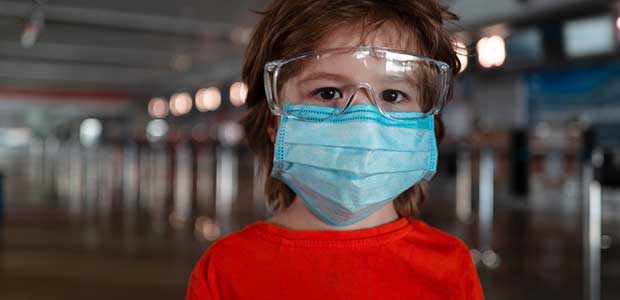
Is Eye Protection Necessary for COVID-19 Protection?
Recent discussions about the possibility of contracting the virus through our eyes are beginning to buzz. Scientists are still studying the virus for the answer, but here’s what experts have to say about the likelihood of eye-contraction and if goggles are necessary.
After virologist and epidemiologist Dr. Joseph Fair recently got ill with COVID-19, he believes he contracted it through his eyes. Fair told NBC that he had been on a crowded flight two weeks earlier, and though he wore a mask and gloves and wiped down his seat, he didn’t have any protection over his eyes.
“You can still get this virus through your eyes, and epidemiologically, it’s the best guess I have of probably how I got it,” Fair said. He said his symptoms started three or four days later, though his four tests for the virus were negative.”
But is this true? Was this a fluke situation? How possible is it to contract the virus through your eyes? Should we be wearing goggles, too? One NPR article notes that the idea that you can contract a virus through your eyes is not new, but it has not been as talked about as other risks of infection through the nose and mouth.
What does the CDC have to say? Well, the CDC says that the nose and mouth are the main avenues by which someone catches the virus, but “it may be possible that a person can get COVID-19 by touching a surface or object that has the virus on it and then touching their own mouth, nose, or possibly their eyes.”
Dr. Abraar Karan, a physician at Harvard Medical School, explains why. “Any sort of open mucosa [mucous membrane] is a chance for a droplet to land there and get into your body,” she said. But while it’s known that the virus can be transmitted through the eyes, “it’s hard to quantify exactly what the risk is in terms [of] through the eye specifically.”
What’s more is that it is very difficult to detect with certainty the initial avenue of someone’s infection—that is, if the virus entered through the person’s mouth, nose or eyes. “And the evidence so far suggests that eyes are not a primary mode of transmission,” said the article.
What evidence exists? If many people were infected through their eyes, there would be more COVID-19 patients with conjunctivitis—inflammation of the eyes, or pink eye.
If the virus invades and infiltrates your conjunctiva—the clear tissue covering the white part of your eye and the inside of your eyelids—likely “there's going to be inflammation or redness in your eyes,” Steinemann says. Of course, there are many other causes for conjunctivitis, though, so getting pink eye doesn't necessarily mean you have COVID-19.
However, there is another reason eyes are not a likely avenue for COVID-19 infection. According to the NPR article, “the pathway from your eyes into your respiratory system is less direct than via your nose and mouth.”
To infect you via your eyes, the virus would have to penetrate your eyes’ mucous membrane, be washed by tears behind your cheeks into your nasal cavity, and then flow from the nose into your throat. “It’s a more circuitous route,” says Steinemann.
As it turns out, your eyes naturally have more protective barriers for things like viruses—more than your mouth and nose do.
What precautions should you take to protect your eyes? Well, the basic precautions against COVID-19 still apply: wash your hands, practice social distancing and “don’t touch your face”—which means don’t rub your eyes.
However, some airlines like Qatar Airlines are asking flight attendants to wear safety goggles in its latest announcement. This makes the public wonder if they should be doing the same. But keep in mind that healthcare settings do require eye coverings and face shields—mostly because they are workers are working face-to-face with potential COVID-19 patients.
Whether or not your need eye protection depends on your job. Most office jobs will not likely require the workers wear eye protection. You do not need face shields or goggles when going to the grocery store, walking outside etc.
On the other hand, Steinemann said, “if you are in close proximity to somebody screaming at you or talking to you or coughing in your face, or if you work in a hospital, suctioning people who are in an intensive care unit — those types of situations are extremely high risk, not only to your nose and your mouth, but also to your eyes. In a high-risk situation, I would definitely recommend the use of a full-face shield and goggles.”
What about the case of the virologist on the packed airplane? Steinemann says if he was on a crowded plane with an inability to keep a safe distance from others, goggles or face coverings might not be a bad idea.